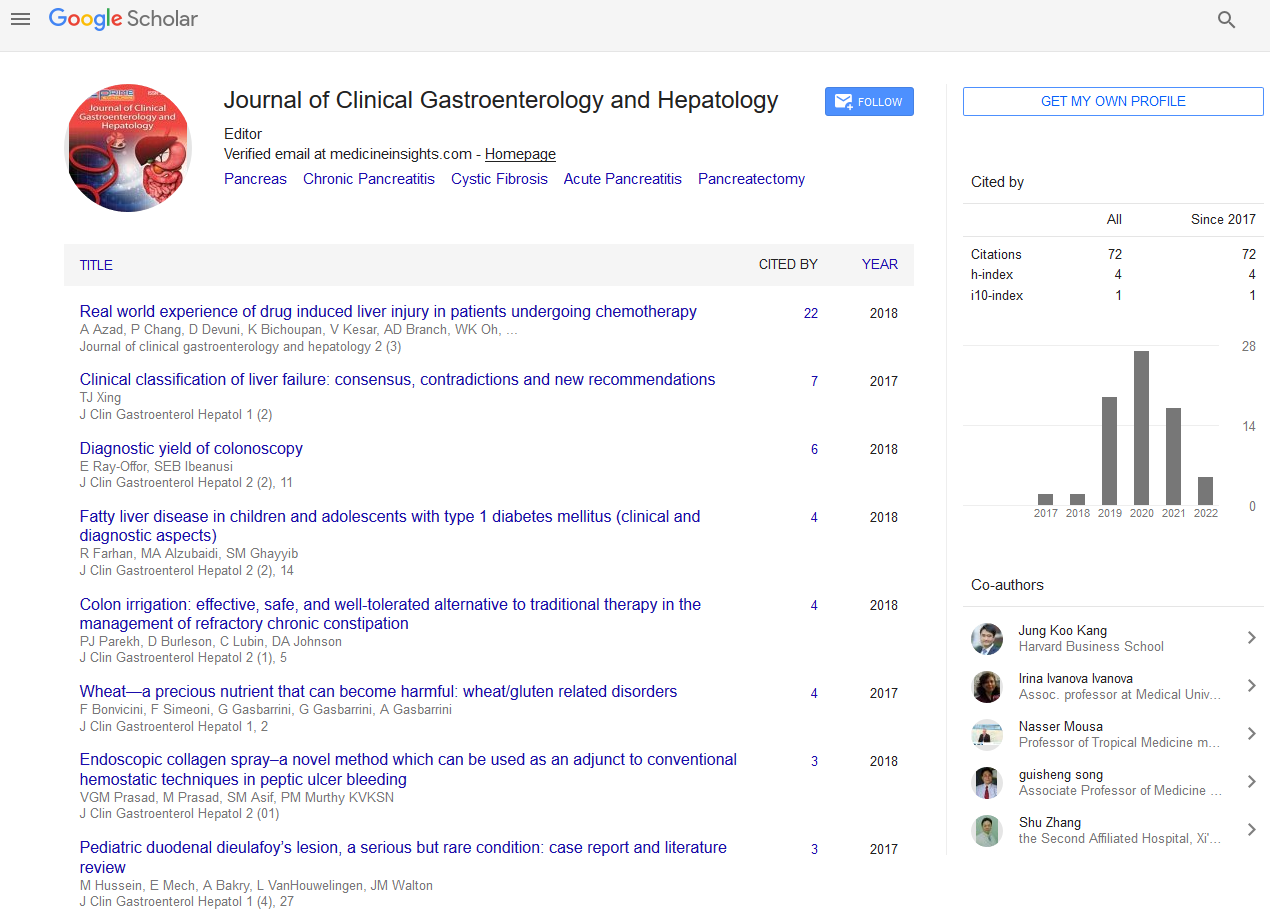Commentary - (2023) Volume 7, Issue 3
Colonoscopy the Colon Seems is Almost Typical in all Types of Minus-cule Colitis
Antonino Spinelli*
Department of Gastroenterology, University School of Medicine, United States
*Correspondence:
Antonino Spinelli,
Department of Gastroenterology, University School of Medicine,
United States,
Email:
Received: 31-May-2023, Manuscript No. IPJCGH-23-16796;
Editor assigned: 02-Jun-2023, Pre QC No. IPJCGH-23-16796;
Reviewed: 16-Jun-2023, QC No. IPJCGH-23-16796;
Revised: 21-Jun-2023, Manuscript No. IPJCGH-23-16796;
Published:
28-Jun-2023, DOI: 10.36648/2575-7733.7.3.30
Description
The condition known as CC has an impact on your large intestine. It causes abdominal pain and episodes of watery diarrhea. Bacterial and viral diseases, certain medications, or certain food sources might set off CC in certain individuals. A colonoscopy may be performed to diagnose this condition. The symptoms of collagenous colitis can be unpleasant and can result in malnutrition and dehydration. However, modifying one’s diet and taking medication can help alleviate symptoms. Collagenous colitis, in contrast to other inflammatory gastrointestinal conditions, is not thought to raise the risk of colon cancer. Although treatment can manage symptoms, there is no cure. Depending on the severity of the symptoms, possible treatments include: Watchful waiting for unknown reasons, some patients with mild symptoms improve without treatment. Caffeine and lactose-containing foods should be avoided as they can exacerbate diarrhea. Consuming a diet low in fat, especially if there is excess fat in the stool due to steatorrhea. Taking cholestyramine, a prescription that diminishes cholesterol levels in the blood. Taking antidiarrheal prescriptions. Coffee, tea, and colas, which contain alcohol or caffeine and are high in sugar or sorbitol, should be avoided because they could exacerbate your symptoms. Pick delicate, simple to-process food sources. Melons, applesauce, bananas, and rice are some examples. Keep away from high-fiber food sources like beans and nuts, and eat just very much cooked vegetables. Microscopic colitis is like any other chronic condition in that it can come and go. It might flare up in response to particular triggers, then go away on its own, come back. Although it is a condition that lasts a lifetime, medical treatment typically makes it manageable. Collagenous colitis has been regarded as a benign, chronic condition. Subsequently, the abundance number of cellular breakdowns in the lungs in ladies with this problem was unforeseen. It will not disappear forever, but it can disappear for some time. Remission is the term for this. Treatment for IBD is centered around working on your side effects and making reduction keep going as far as might be feasible. This holds true even in the event that your colitis is brought on by a condition that cannot be fixed. In patients with budesonide-refractory microscopic colitis, thiopurines, anti-tumor necrosis factor (TNF) medications, or vedolizumab are recommended treatments to induce and maintain clinical remission. Ulcerative colitis does not have a cure, but there are a few treatment options. Medicines incorporate a medical procedure, dietary changes, and prescriptions. Yoga, omega-3 fatty acids, and some herbs are among some natural remedies that have been shown to be beneficial to people with ulcerative colitis. A type of inflammatory bowel disease that affects the colon is collagenous colitis. It is a type of minute colitis, which causes persistent looseness of the bowels. On colonoscopy, the colon appears normal or nearly normal in all forms of microscopic colitis; however, when a biopsy of the colon is examined under a microscope, the inflammation is visible. This disease typically results in between four and nine watery bowel movements per day, though more than fifteen may occur in rare instances. There may also be a variety of other body symptoms or gastrointestinal system symptoms. There are two kinds of inflammatory bowel disease: Collagenous colitis and lymphocytic colitis. Both of these conditions involve inflammation of the colon, which is the last part of the bowel that ends at the anus. The most well-known side effect is watery, non-ridiculous loose bowels. Dietary changes and medical treatment, including medication, can typically manage symptoms.
Acknowledgement
None
Conflict Of Interest
The authors declare that they have no conflict of interest.
Citation: Spinelli A (2023) Colonoscopy the Colon Seems is Almost Typical in all Types of Minuscule Colitis. J Clin Gastroenterol Hepatol. 7:30.
Copyright: ©2023 Spinelli A. This is an open-access article distributed under the terms of the Creative Commons Attribution License, which permits unrestricted use, distribution, and reproduction in any medium, provided the original author and source are credited.

